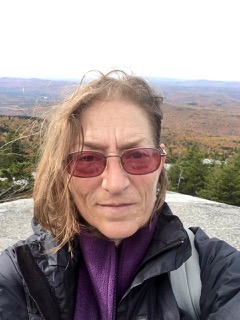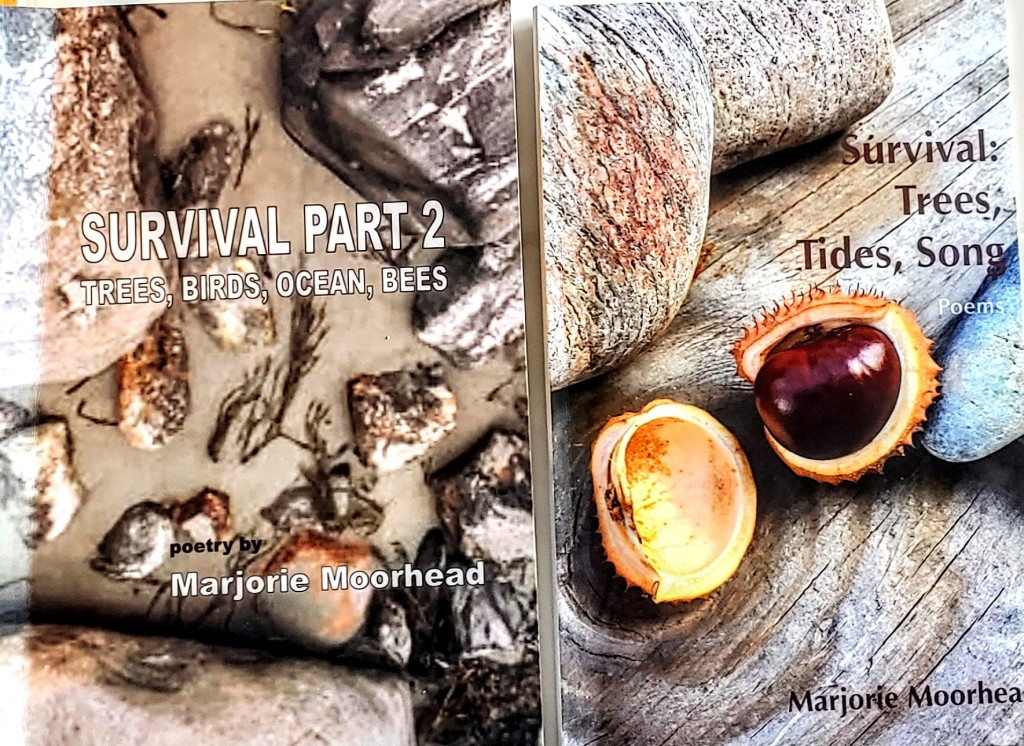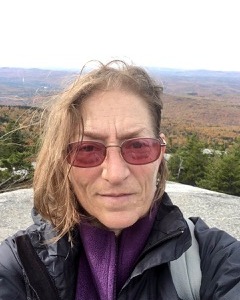Survival: Trees, Tides, Song & Survival Part 2: Trees, Birds, Ocean, Bees
by Majorie Moorhead
Review and Interview by Risa Denenberg
In the bio on the back of Survival: Trees, Tides, Song (Finishing Line Press, 2019) is this line, “Marjorie [Moorhead] strives to walk her daily path with open eyes and heart.” In this book, Moorhead does indeed show us an open heart and incisive vision. The poems feel earnest and instructive, as if saying to the reader: here, follow me. While the poems flow towards the quotidian in their subject matter, extolling the natural world, Moorhead has a liquid voice and throws end rhymes together with a passion that is both quiet and convincing and a subtlety of metaphor that can surprise. In language, she allows us to see nature as she sees it. In “Choir,” we see how, like humans, withered leaves cling to trees until they can no longer hold on, and how trees eventually must shed them, to become deciduous, empty, barren, relating to the human experience where, “. . . leaving childhood brings doubts and clouds.” This poem appears in both volumes, bringing a unifying force to the project, by showing the wonder and harmony Morehead finds in trees: “Nature and I were one and the same, and that same was Perfection.”
In Survival: Trees, Tides, Song, in the poem, “East Thetford, VT,” we find this meditation:
Walking saved me years ago
Walking the same route every day
Day after day season after season.
//
Backdrop-sky for stone house, wood barn
tall stalks, big trees, lilacs.
At sunset simple silhouettes framing pink and orange-purple swaths.
///
Relationship with land can be just a road
claimed with each footstep.
You know it, because you walk it.
I enjoyed the fluid and welcoming voice in the first volume. The narrator finds solace, poem after poem, in the Trees, Tides and [bird] Song, of the book’s title. The notion of survival is inherent throughout the book—surviving cold seasons and rainy weather with hopefulness, and darker things such as toxins and wars with sorrow and protest. Titles display changeable moods, as when “The Wisdom of Geese” praises “watching out for one another” while in “Things I’ve seen in the Anthropocene (Make Me Wanna Holler), the speaker is “feeling sad and mean.”
The sequel, Survival Part 2: Trees, Birds, Ocean, Bees (Duck Lake Books, 2020), displays the same fluid voice and quiet passion, along with the trope of taking refuge from human folly through immersing in nature. In “Colored Birds Bouquet, a Coexistence Triolet,” are these joyous lines:
Birds come to the feeder, colored like a luscious bouquet of flowers.
Awareness that we share this planet making me so buoyantly happy.
//
These sweet little creatures’ presence wielding incredible powers
to elicit empathy, wonder, fascination; emotions strong as nectar is sappy.
Or in “Chorus”
Just the tips;
small green ears
alert in the soil, reaching for a sound,
And in “Ocean Villanelle,” these lines,
It’s the sound that I love; it speaks to me.
A song of connection,
reminding of eternity.
Despite the loving connection with nature, I found a subtle shift in balance in this volume, with more poems protesting harmful human behavior, as in “The Rain and the Flower” where the narrator finds “more song in a raindrop” than “those accustomed to luxury” find in an orchestra. Or in “Walking With the Wind,” the dichotomy of,
. . . the Haves, who leave behind
the Have Nots for warmer climes
when a chill sets in.
There is always this problem of course: the difficulty in writing a protest poem without becoming didactic; the risk of alienating a reader. Perhaps over the course of writing these poems, not to mention over the course of her life, Moorhead has vacillated, as have most of us, between hope and despair, and has tempered despair with protest. And no doubt her sense of urgency (matched by our sense of urgency) to send a message before it is too late has intensified as well. Like a teacher who might slip into scolding when she feels her words unheeded. Of course, scolding is necessary at times.
However, there is exaltation in these words in “Colony Collapse,” “Disappearing Bees desperately needed as balm in an ailing system.” And in “Borders,” Moorhead navigates murky waters with compassion:
We could be under rain drops anywhere. Tragedy visits anywhere.
Where do we find ourselves? Borders in our minds.
What we could fathom and what we could not.
Rising sea levels. Depleting ice caps. Dividing lines.
In the back matter to both books, we deepen our understanding of survival for Moorhead as we learn that she is an “AIDS survivor.” We also learn some details of her journey. I always appreciate learning what I can about a poet’s life. Moorhead exhorts us to:
. . . find our voice and speak our truth; listen to others’ voices and truths and get to know our intimate relationship with our environment. This is required for healthy survival.
I wanted to learn more about Moorhead, to more fully hear her voice and her truth. I conducted the following interview with her by email:
eview and Interview by Risa Denenberg
Risa Denenberg: Your books incorporate the term “survivor.” How has your identity as an AIDS survivor impacted your vision as a poet? Have you written about your journey as an AIDS survivor? How did you incorporate that impact on the person who walks through the woods and oceans and seasons in these poems?
Marjorie Moorhead: Being a survivor of AIDS (from a time when there was no viable treatment) has shaped my vision as a poet because I learned, during many, many hours and years “alone” with myself, traveling through grief to self-discovery, to SEE things, “in the moment”. If you travel around with death in your lap, ready to take over at any moment, each moment seems indeed a gift and full of rich detail. Each breath becomes a full and wonder-full moment; the in, and then the out. I spent at least five years learning to meditate, and practice tai chi ch’uan. My goal in those years (as, of course it should be for everybody all the time…but gets lost so easily once Life is “easy”), was to live in a state of Grace in each moment. I had to figure out what that meant for myself. It’s a very personal interpretation of the word “Grace,” as I was not brought up with religious practice or dogma except for very general overlying morality (which I am grateful for!). So, the person walking through woods, oceans, seasons in these poems is one who is noticing, processing, and feeling a part of where she is.
RD: How did you and your partner at the time, Jorge Soto Sanchez, decide to leave NYC and settle in Vermont? Did you find there what you were hoping to find?
MM: Jorge and I left NYC for VT because we needed a place where he could escape his “demons” and focus on his work. I left first, coming home to the area I’d grown up in, and he followed to be with me. And, yes, I’d say we did have, for a few years before illness from the virus took hold with him, a life of creativity, personal growth, health, and love. I feel happy that he was able to experience that before losing his life at age 40.
RD: I enjoy your clear yet metaphoric-laced language in both parts of the Survival chapbooks. I find a somewhat different tone between the first and second books. Most specifically, there seemed to be more doubt and anger in “Part 2.” Was there a change in your perspective over the months that you wrote these two books?
MM: I don’t see the difference in emphasis you’ve noticed between my first, and second chapbooks. For me, the second was just more of the same river of writing that combined my personal sense of survival with broader elements of survival which include Mothering, nurturing a long time partnership, and stewardship of the planet.
RD: Finally, I hope you are safe and well. Can you talk a bit about how you are faring during the pandemic?
MM: At the start of this pandemic, I was very aware of the link back in time to the AIDS epidemic. I started writing “Coronavirus Diary” poems (to date, I think there are 12 of them!), and also responded, in April, to the call from Indolent Books’ HIV Here & Now “Na(HIV)PoWriMo” project for poems about HIV/AIDS. I have since moved on to writing a series of poems inspired by the Bluejays who built a nest outside within view of our window. Watching their daily journey, while in “lockdown”, has been a way to expand out into the world and I’ve attempted writing a few poems where the “I” is a nesting bird. I also try to get out for a daily walk, just breathing and moving and noticing what’s around me…same as I have been doing for thirty years or more.
Review by Risa Denenberg

Marjorie Moorhead writes from a New England river valley, surrounded by mountains and four season change. She found a voice in poetry after surviving AIDS in its early years, and becoming a mother. Much of Marjorie’s work addresses survival, environment, relationship, and appreciation of the “everyday”. Her poems are found in several anthologies, including those that benefit environmental and women’s organizations. Poems are in journals and sites such as Amethyst Review, Tiny Seed Literary, Sheila-Na-Gig, Porter House Review, Poeming Pigeon, Verse-Virtual, What Rough Beast and HIV Here & Now. Marjorie’s debut chapbook is Survival: Trees, Tides, Song (Finishing Line Press 2019), followed by Survival Part 2: Trees, Birds, Ocean, Bees. She is happy to have been awarded an Indolent Books tuition scholarship for Fine Arts Work Center’s poetry week in summer 2019.

Title: Survival: Trees, Tides, Song
Author: Marjorie Moorhead
Press: Finishing Line Press, 2020
ISBN-10: 1635349230
ISBN-13: 978-1635349238
BUY IT!
Title: Survival Part 2: Trees, Birds, Ocean, Bees
Author: Marjorie Moorhead
Press: Duck Lake Books, 2020
ISBN-10: 1943900361
ISBN-13: 978-1943900367
BUY IT!
Risa Denenberg lives on the Olympic peninsula in Washington state, where she works as a nurse practitioner. She is a co-founder and editor at Headmistress Press, publisher of lesbian/bi/trans poetry. She curates The Poetry Café, an online meeting place where poetry chapbooks are celebrated and reviewed. She has published three chapbooks and three full length collections of poetry, most recently, “slight faith” (MoonPath Press, 2018).

